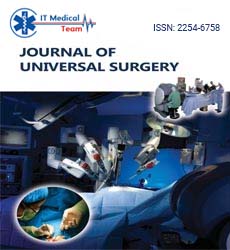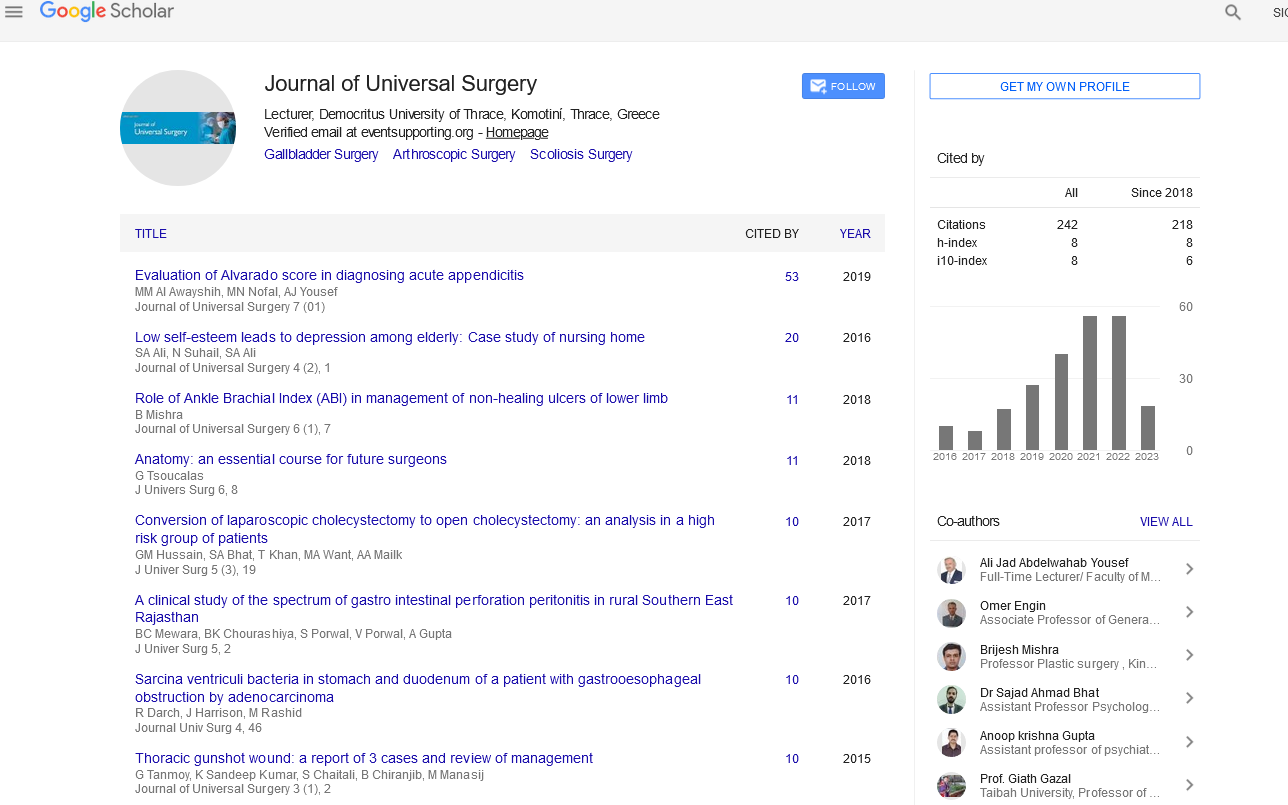Perspective - (2023) Volume 11, Issue 6
Advancements in colorectal surgery: A comprehensive overview
Eric Lasonie*
Department of General Surgeon, University of Caimitillo, Province of Panama, Panama
*Correspondence:
Eric Lasonie, Department of General Surgeon, University of Caimitillo, Province of Panama,
Panama,
Email:
Received: 06-Nov-2023, Manuscript No. ipjus-23-14347;
Editor assigned: 09-Nov-2023, Pre QC No. P-14347;
Reviewed: 23-Nov-2023, QC No. Q-14347;
Revised: 11-Dec-2023, Manuscript No. R-14347;
Published:
19-Dec-2023
Introduction
Colorectal surgery has witnessed significant advancements
in recent years, transforming the landscape of treatment
options for various colorectal conditions. As a branch
of surgery that deals with disorders affecting the colon,
rectum, and anus, colorectal surgery plays a crucial role in
improving patient outcomes and quality of life. This article
explores the latest innovations and techniques in colorectal
surgery, highlighting their impact on patient care and
recovery.
Description
Minimally invasive surgery
One of the most notable advancements in colorectal
surgery is the widespread adoption of minimally invasive
techniques. Traditional open surgeries are being increasingly
replaced by laparoscopic and robotic-assisted procedures.
These minimally invasive approaches offer several benefits,
including smaller incisions, reduced postoperative pain,
shorter hospital stays, and quicker recovery times.
Laparoscopic colorectal surgery involves the use of
small incisions through which a camera and specialized
instruments are inserted. Surgeons can visualize the surgical
field on a monitor and perform intricate procedures
with precision. Robotic-assisted surgery takes this a step
further, providing surgeons with enhanced dexterity and
3D visualization. These advancements minimize trauma
to surrounding tissues, resulting in less scarring and faster
recovery for patients.
Enhanced Recovery After Surgery (ERAS)
protocols
The implementation of Enhanced Recovery After
Surgery (ERAS) protocols has significantly improved the
perioperative care of colorectal surgery patients. ERAS
is a multidisciplinary approach that involves optimizing
various aspects of patient care, including nutrition, pain
management, and early mobilization. By streamlining the
entire perioperative process, ERAS protocols aim to reduce
stress on the body and facilitate a quicker return to normal
activities.
ERAS protocols focus on evidence-based practices such as
preoperative counseling, carbohydrate loading, and opioid sparing pain management strategies. These measures not
only enhance patient satisfaction but also contribute to
a decreased length of hospital stay and overall healthcare
costs.
Transanal Total Mesorectal Excision (taTME)
Transanal Total Mesorectal Excision (taTME) represents a
groundbreaking development in the surgical treatment of
rectal cancer. This technique involves accessing the rectum
through the anus, allowing surgeons to perform a more
precise dissection of the mesorectal plane. By combining
laparoscopic and transanal approaches, taTME offers
improved visualization and access to the lower rectum.
taTME has proven particularly beneficial in cases where
traditional laparoscopic approaches face challenges, such as
a narrow pelvis or a tumor close to the anal sphincters. This
innovative technique has been associated with lower rates
of complications and improved oncological outcomes,
making it a valuable addition to the colorectal surgeon's
armamentarium.
Organ preservation strategies
In recent years, there has been a paradigm shift towards
organ preservation strategies in colorectal surgery,
especially in the treatment of rectal cancer. The goal is to
avoid radical surgery whenever possible, thereby preserving
normal bowel function and quality of life for the patient.
Organ preservation strategies include watchful waiting,
local excision, and neoadjuvant therapies.
Neoadjuvant therapies, such as radiation and
chemotherapy, are administered before surgery to shrink
tumors and improve the chances of preserving the rectum.
This approach has been successful in downstaging tumors,
allowing for less invasive surgical interventions. The
judicious use of organ preservation strategies requires a personalized and multidisciplinary approach, considering
the unique characteristics of each patient and their specific
cancer.
Advances in imaging techniques
The accuracy of preoperative staging is crucial for planning
the appropriate surgical approach in colorectal surgery.
Advances in imaging techniques, such as Magnetic
Resonance Imaging (MRI), have significantly improved
the ability to assess tumor characteristics, involvement of
adjacent structures, and lymph node status.
MRI with high-resolution imaging and functional
sequences provides detailed information that aids surgeons
in planning the extent of resection and identifying
potential challenges during surgery. Accurate preoperative
staging helps in avoiding unnecessary radical procedures
and guides surgeons in tailoring their approach to the
individual patient's anatomy and pathology.
Conclusion
Colorectal surgery has evolved dramatically in recent
years, with innovations ranging from minimally
invasive techniques and enhanced recovery protocols
to groundbreaking approaches like taTME and organ
preservation strategies. These advancements collectively
contribute to improved patient outcomes, reduced
morbidity, and enhanced quality of life.
As technology continues to advance and our understanding
of colorectal diseases deepens, the field of colorectal
surgery is poised for further transformative changes. The
ongoing pursuit of less invasive, more personalized, and
organ-preserving strategies underscores the commitment
of colorectal surgeons to optimizing patient care and
outcomes in the years to come.





